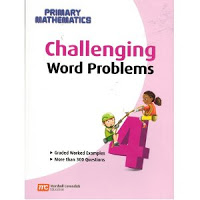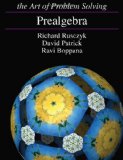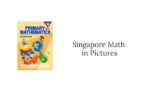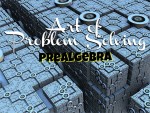This school year I’ve adjusted our math to better meet the needs of my kids. Last school year I had some psycho-educational testing done on my boys to figure out their skills, abilities, and how to best teach them. Testing gave me some valuable information and as a result I decided to compact and accelerate our math program for now. By compacting and accelerating I mean that we are doing less of all the Singapore Primary Mathematics parts and going through it quicker. I’ve been one to go slow and steady through math and not skip anything, but that wasn’t the best fit for my boys right now.
Basically, I have one-on-one daily math time with each child. I ditched the workbook and the Intensive Practice workbook and we going through the textbook. I have them do problems orally or on a whiteboard. If they get the concept or already know the concept we do very few problems. If they need more practice we do all or most of the problems. To reinforce and add challenge I do assign problems from the Challenging Word Problems workbooks. The Challenging Word Problems
can be quite challenging at times (even for me). I also continue to do all of the mental math exercises in the instructor’s manual. These have been huge in helping my child’s mental math abilities.
As we go along I adjust the pace according to how my child is progressing. If things get tough we slow down a little. If they are easy I put a little more on our plate the next day. I have all the assignments listed chronologically so I just write down each day how many we will tackle. We can typically tackle 2-4 days worth of the Singapore Primary Mathematics text in a day.
I allot one hour towards math for my 3rd and 5th grader. Right now I’m slowing down the pace a little with my visual-spatial learner while he masters his multiplication facts and gets exposure to number concepts that he has not encountered in his studies. Numberphile videos are a good source for him. He is a kid that finds interest in the math beyond arithmetic but his skills don’t allow him to jump ahead that far. Arithmetic is not close to being loved so I’m exposing him to more difficult number concepts to help develop his interests while he masters arithmetic.
Currently a day of math for my 3rd grader might be: 2-3 videos depending on length, practice on multiplication facts (one-on-one), mental math exercises (1 column from the appendix), and about 2-3 days worth of the Singapore text. When he has a Challenging Word Problem assignment (just one problem at a time) some other part of the math day is shorter. I work with him one-on-one with multiplication facts because that is the only way it works with him. Letting him use a fun computer program or computer flashcards did not work at all. We sat down and came up with little tricks to remember a fact like 8×8=64 (The number 4 ate and ate and ate and become a sicky four).
My 5th grader is moving at a steady clip right now. I’ve gone quite slowly with him the past few years and he definitely needs a quicker pace. He has a goal of being finished with Singapore 5B by Christmas. I don’t know if he will make it, but it may be close. He is looking forward to starting Art of Problem Solving Prealgebra. A typical day of math for him might be 4 days of Singapore textbook lessons, a math video, independent math fact practice, and a Challenging Word Problem. He just finished all the mental math exercises that I’m going to require (through the 4B instructor’s manual).
I was hesitant to compact and accelerate and I questioned whether it was wise especially for my 3rd grader. The testing convinced me that I needed to get him through arithmetic quicker rather than slower. He was one who would take 30 minutes on a problem and get it wrong. Why would I want to accelerate there? It turns out that he was bored and quite distracted by his thoughts and his world around him. He does better learning simpler concepts through more difficult math problems.
So if you have reasons to consider accelerating or compacting Singapore or any other math program, I’d suggest you give it a try. I see positive results here. It is labor intensive for me. I have almost 2 hours a day dedicated to math one-on-one. Add to that the math bingo fun I’m having with my little girl and it goes over 2 hours just on math. I do think the little extra labor will pay off with children who are more engaged in math. Since both of my boys currently want to go into STEM related careers I want to make sure their math skills are strong. At the same time I want to foster an enjoyment of math. Arithmetic impedes that enjoyment so on we will go towards true mathematics where we can take our time and explore different concepts and ideas.









This is what I was looking for … I plan to do it for I notice that things are too simple at certain parts in 4a and we could accelerate a bit but I had doubts until I read this… Thank you.
This was very helpful for me to read. I struggle with getting my 9 year old through math and I really think it’s because she’s bored. I think maybe condensing things (which I have done occasionally) will help. Thanks for sharing what you are doing! I need to check out the videos as well.
Thanks for the post! Singapore Math is not only for primary school students. It s confined to beyond the primary school levels such as secondary school levels and the junior college levels.
Vi Hart videos are awesome too. http://vihart.com/
Sounds like a very similar track to the one I have my son on (Singapore and other resources leading to AoPS). You have a few new ideas for me to look at, too (I haven’t heard of Numberphile). Thanks!